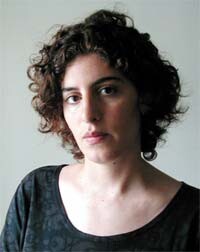The Electronic Intifada 27 January 2004

Production still from Like Twenty Impossibles.
“Like Twenty Impossibles” is the work of Annemarie Jacir, co-written with Kamran Rastegar. Jacir is a Palestinian filmmaker, activist, and poet living between New York City and Palestine. The 17-minute short mockumentary tells the story of a journey in a country where checkpoints and a sinister patchwork of controlled areas make freedom of movement itself impossible.
In the first sublime moments of this award-winning film, a shaky handheld camera puts the viewer in a landscape outside Jerusalem. As a voiceover and subtitles relate childhood memories of family and place, the scenery is sweeping and idyllic. As the narrative returns to the present, we find ourselves in a taxi carrying a film crew towards a military checkpoint controlling entry to Jerusalem.
In this film, a young director — lending authenticity to the film and suggesting it is autobiographical — has returned to the West Bank after living in the U.S. for several years, nostalgic for the place she left behind. As the crew waits in line at the checkpoint, they speak of happier times in Jerusalem. They predict the barrier will soon become a border. The actor accompanying the crew, Rami, thinks about his wedding day and contemplates the difficulties for his bride. Outside the car, travelers are milling in imposed confusion. Inside, the artists joke about risk and love.
The checkpoint closes, and the driver suggests a side road. The director agrees, “Why not? Let’s try it.” The production is behind schedule.
As they navigate a dirt road to avoid the first checkpoint, they encounter a second, unexpected checkpoint. The director remains certain the soldiers cannot stop them, producing a U.S. passport, which reveals her name is Annemarie. She is confident in her ability to protect the crew. The isolated countryside in which the confrontation is brewing foreshadows otherwise.
There is a human side to the checkpoint soldiers, their authority is fallible and frightening. Attempts to reason with them result in the crew being treated as uncooperative, demonstrating the insidious nature of oppression, which blames the victims for their own subjugation.
The actor Rami is tense and quiet. A request for identification reveals his name is on a list. The sound man, Mohammed, is a Palestinian from within Israel, and has an Israeli-issued ID which attracts the attention of the soldiers. It is illegal for him to travel in the West Bank, even though he is an Arab, and the fine is 2,000 shekels.
It is unclear why the soldiers detain Rami. One infers from the dialogue that his acting career has unjustly labeled him subversive. Annemarie remains full of assurances, but Rami fears physical abuse and Mohammed warns that the soldiers can “do what they want.” They detain Rami and Mohammed and order the crew to stop their covert filming of the incident. As the camera keeps rolling in defiance, tragedy seems inevitable.
In the heightening tension, the young director’s brow knits tight, and the devices of mockumentary become more apparent. The critical dialogue taking place in murmured English, as if just within range of Mohammed’s microphone, forces the audience to strain to hear as the characters themselves are doing. Annemarie maintains to the soldiers she has permission to travel freely and work on her film. She asserts she is home, drawing power from the setting, but her hopes for a reasonable conclusion come undone, as she is ultimately unable to convince the soldiers to release Rami and Mohammed.
This inconclusive and intrusive end speaks of the thousands of frustrating and painful checkpoint experiences that Palestinians have each day, actual footage of which the director uses at the beginning of the film to offer the context to this particular story.

Annemarie Jacir
The tenacious onscreen Annemarie is really actress Reem Abu-Sbaih. Ismail Dabbage and Ashraf Abu Moch portray romantic Rami and indolent Mohammed, and director of photography, Phillip Bellaische is the hand that holds the camera. As disbelief slowly returns from suspension, the exploration of oppression becomes more meaningful through story than is possible through reporting.
The credits end with an excerpt of poetry from “We Shall Remain” by Tawfiq Zayyad, 1965:
It is a thousand times easier for you
To pass an elephant through the needle’s eye.
To catch fried fish in the Milky Way…
A thousand times easier
Than smoldering with your oppression
The spark of an idea
Like twenty impossibles
We shall remain.
Given the short lyrical qualities of the film, poetry may be the most accurate way to describe it.
In 2003, Like Twenty Impossibles received the “Best Film” award at the Palm Spring Festival of Film Shorts, and “Best Short Film” award at the Independent Film Project New York Market. It was a New York Regional finalist in the Alternative Category for the 30th Student Academy Awards.
Jacir is also winner of the Kathryn H. Parlan Screenwriting Award at Columbia University and a Zaki Gordon Award for Excellence in Screenwriting. She has taught courses at Barnard College, Columbia University, Bethlehem University and Birzeit University. Publications include Ripe Guava and Mizna, and selections of her poetry are featured in “Arab Women Writers: A Contemporary Anthology” published by Interlink Publishers.
Tina Dybvik is a writer based in Minnesota.
Related Links



